Business in Congo, Brazzaville, Pointe-Noire

Republic of the Congo: emerging country. Congolese Petroleum
- Introduction to the Republic of the Congo (Central Africa)
- Théophile Obenga (Congolese Historian)
- Congolese Economy
- International Trade of the Republic of the Congo
- Customs of the Republic of the Congo
- Port of Pointe Noire
- Case Study:
- Congo Basin (the second World's largest rain forest)
- Special Economic Zones in Congo
- Congo Terminal. Port of Pointe-Noire
- Congolese Petroleum industry
- Business and Investment Opportunities in the Congo
- Agriculture
- Mining
- Great Works Programme
- Infrastructure development
- Tourism
- Access to the Congolese market
- Business Plan for the Republic of the Congo
The objectives of the subject “International Trade and Business in the Congo”: are the following:
- To analyze the Congolese Economy and Global Trade
- To know the trade opportunities in the Congo
- To explore the trade relations of the Republic of the Congo with the country of the student
- To know the Congolese Trade Agreements
- To develop a business plan for the Congolese market

The Subject “Foreign Trade and Business in the Congo” belongs to the following Online Programs taught by EENI Global Business School:
Master in Business in Africa, Transport in Africa, International Business, Foreign Trade, International Transport.
Doctorate in African Business, World Trade.
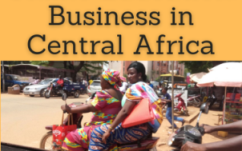

EENI Partnerships with Educational Institutions
Languages:  or
or  Congo
Congo  Congo
Congo  Congo.
Congo.
- Credits of the subject “Doing Business in the Congo”: 1

- Duration: one week

International Trade and Business in the Congo:
Government Vision 2025: “Congo: an emerging country.”

- Port of Pointe Noire
- Access to the Tripoli - Congo - Windhoek Corridor
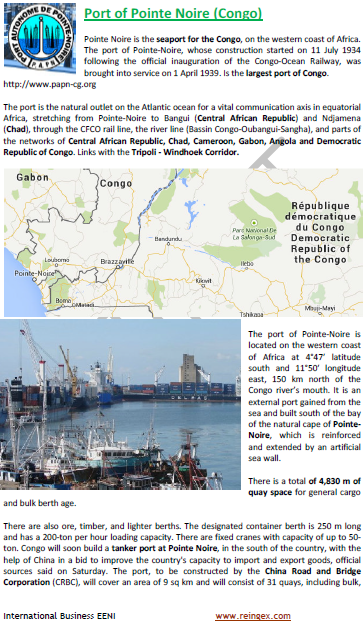


The Republic of the Congo's Preferential Trade Agreements:

- WTO
- GATS
- Agreement on the Application of Sanitary Measures
- Agreement on Technical Barriers to Trade
- Agreement on Preshipment Inspection
- Agreement on Safeguards
- Trade Facilitation Agreement
- WCO
- Rotterdam Rules

- Economic Commission for Africa
- African Union
- AU Convention on Preventing and Combating Corruption
- AUDA-NEPAD
- African Development Bank
- Africa-Asia Partnership
- Africa-India Cooperation
- Africa-BRICS
- Africa-Turkey Partnership
- Africa-Korea Partnership
- Afro-Arab Cooperation
- BADEA

Global Organizations. The Republic of the Congo is a member of...
- UN
- WB
- WTO
- IMF
The Republic of the Congo is a developing country included in the heavily indebted poor countries initiative.
- Agriculture is the main economic activity of the Republic of the Congo
- Congolese languages: French, Lingala, and Kikongo
- The main cities in Congo are Brazzaville (Capital, 2 million people), Pointe-Noire (economic capital, 500,000 people), Nkayi, and Dolisie
- The borders of the Republic of the Congo are Cameroon, the Central African Republic, Angola, the DR Congo, and Gabon
- Independence of the Republic of the Congo: 1960 (from France)
- Area of the Republic of the Congo: 341,821 km²
- Congolese population: 4,012,809
- The Departments of the Republic of the Congo are Likouala (Impfondo), Sangha (Ouesso), Cuvette Ouest (Ewo), bowl (Owando), Plateaux (Djambala), Pool (Kinkala), Bouenza (Madingou), Lekoumou (Sibiti), Niari (Dolisie) Kouilou (Pointe-Noire), and Brazzaville
More information: The Republic of the Congo (EENI African Business Portal).
Religion in the Congo:
- Christianity (50%): Catholicism (1.8 million) and Protestants (Methodists: 2 million)
- African Traditional Religions (48%)
- Islam (2%)

The Republic of the Congo belongs to the Central African Economic Area.
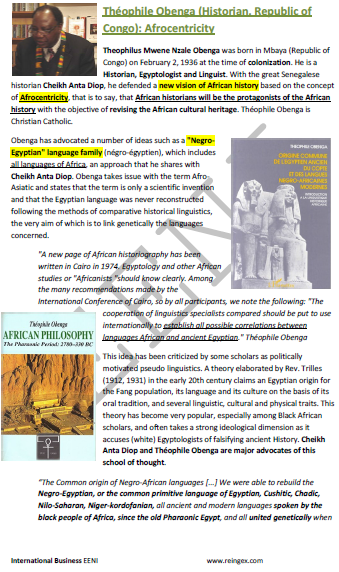

Economy of the Republic of the Congo:
- The economic efficiency of the Republic of the Congo (Africa) owes a great deal to the increase of the Congolese petroleum production (115 million barrels)
- Fiscal reform and debt relief obtained under the Heavily Indebted Poor Countries Initiative
- Top economic sectors of the Republic of the Congo: agriculture, Petrol, and services
- Petrol (the fourth African producer), wood, manganese, natural gas, gold, iron, diamonds, copper, potassium, and zinc
- Petroleum production: 10 to 15 million tones annually. The Congolese reserves remain relevant
- Hydroelectric Potential: 2,500 megawatts
- The largest potash producer in Africa. Potash reserves: 800 billion tones
- Iron: 1 billion tones
- Congolese gas reserves: 120 billion m3
- Gold Fields in operation: 100 t/year over 30 years
- Top Congolese trade partners: The U.S., France, China, India, the Emirates, and South Korea
- Top Congolese exports are petrol, timber, minerals, copper, precious stones
- Port of Pointe-Noire: the only Central African deep-sea port
Global Trade and Business in the Congo:
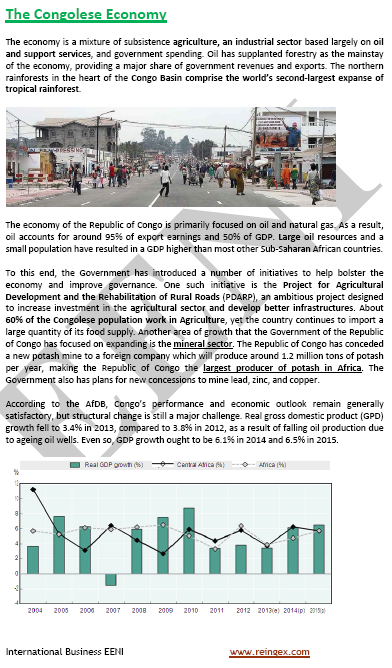
The Republic of the Congo has many advantages and offers many business opportunities.
The preferred sectors for the foreign direct investment are:
- Agriculture, livestock, and fisheries
- Building and public works
- Forests
- Mining
- Energy
- Industry
- Tourism and hospitality
- Telecommunications
- Health and housing
- Education
- Banks, insurance, and microfinance
- Services
- Real Estate.
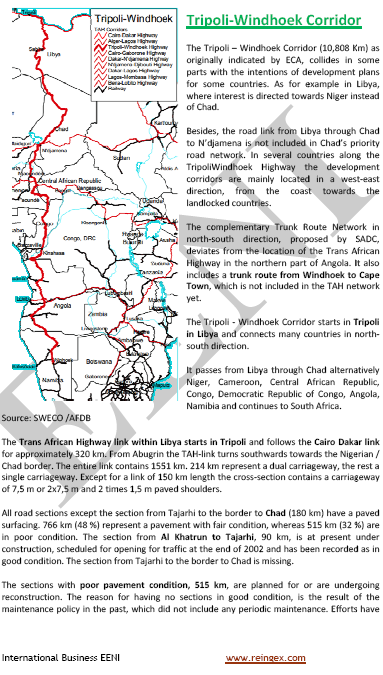
(c) EENI Global Business School (1995-2024)
We do not use cookies
Top of this page



